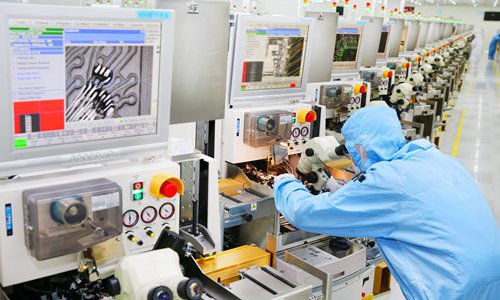HOME >> BUSINESS
Japan-S.Korea spat may be boon for Chinese chipmakers
Source:Global Times Published: 2019/8/14 19:58:40

An engineer analyzes chips at a chip factory in Nantong, East China's Jiangsu Province in February. Photo: VCG
An escalating diplomatic and trade row between Japan and South Korea, which has seen the two technological powerhouses imposing bans on trade in high-technology materials, could be another boon for Chinese companies in the area of semiconductors, an industry analyst said on Wednesday.
The ban by Japan on exports of essential materials for South Korean chipmakers might have pushed some companies to shift toward suppliers based in China to avoid the ban, offering a boost for the Chinese companies that are already in the spotlight amid the China-US technology war.
A latest sign in the shift came from Japan's Morita Chemical Industries, which announced after the export ban that it would start to produce ultrapure hydrogen fluoride in via its joint venture in East China's Zhejiang Province, the Nikkei Asian Review reported on Saturday. The chemical is used to clean and etch silicon wafers for semiconductors.
South Korea's Samsung Electronics has also reportedly started to test Chinese-made substitutes for the chemical materials to avoid disruption to its chip production line.
"If the ban persists, this could be an opportunity for Chinese companies to step up and fill any void that may be open," Xiang Ligang, a Beijing-based industry analyst, told the Global Times on Wednesday.
Though the Japanese government showed signs of easing the tension by allowing exports of certain semiconductor manufacturing material to South Korea last week, the spat is far from being resolved as the divide between the two over deep-seated emotional and historical issues lingers.
Xiang said that under a national drive to reduce reliance on foreign chips, Chinese companies at various stages of the supply chain have been scrambling to step up their research and development and production.
"I think they are ready to provide supplies if there is any market," he said.
Posted in: INDUSTRIES,MARKETS